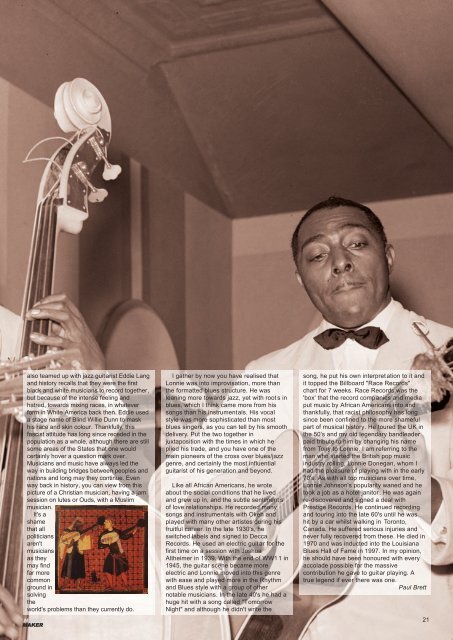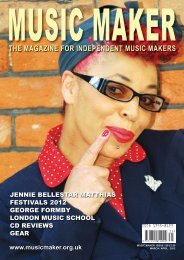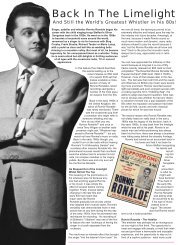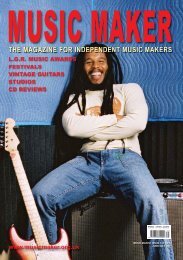the magazine for independent music makers - The Music Maker Guide
the magazine for independent music makers - The Music Maker Guide
the magazine for independent music makers - The Music Maker Guide
Create successful ePaper yourself
Turn your PDF publications into a flip-book with our unique Google optimized e-Paper software.
also teamed up with jazz guitarist Eddie Lang<br />
and history recalls that <strong>the</strong>y were <strong>the</strong> first<br />
black and white <strong>music</strong>ians to record toge<strong>the</strong>r,<br />
but because of <strong>the</strong> intense feeling and<br />
hatred, towards mixing races, in whatever<br />
<strong>for</strong>m in White America back <strong>the</strong>n. Eddie used<br />
a stage name of Blind Willie Dunn to mask<br />
his race and skin colour. Thankfully, this<br />
fascist attitude has long since receded in <strong>the</strong><br />
population as a whole, although <strong>the</strong>re are still<br />
some areas of <strong>the</strong> States that one would<br />
certainly hover a question mark over.<br />
<strong>Music</strong>ians and <strong>music</strong> have always led <strong>the</strong><br />
way in building bridges between peoples and<br />
nations and long may <strong>the</strong>y continue. Even<br />
way back in history, you can view from this<br />
picture of a Christian <strong>music</strong>ian, having a jam<br />
session on lutes or Ouds, with a Muslim<br />
<strong>music</strong>ian.<br />
It's a<br />
shame<br />
that all<br />
politicians<br />
aren't<br />
<strong>music</strong>ians<br />
as <strong>the</strong>y<br />
may find<br />
far more<br />
common<br />
ground in<br />
solving<br />
<strong>the</strong><br />
world's problems than <strong>the</strong>y currently do.<br />
MUSIC<br />
MAKER<br />
I ga<strong>the</strong>r by now you have realised that<br />
Lonnie was into improvisation, more than<br />
<strong>the</strong> <strong>for</strong>matted blues structure. He was<br />
leaning more towards jazz, yet with root s in<br />
blues, which I think came more from his<br />
songs than his instrumentals. His vocal<br />
style was more sophisticated than most<br />
blues singers, as you can tell by his smooth<br />
delivery. Put <strong>the</strong> two toge<strong>the</strong>r in<br />
juxtaposition with <strong>the</strong> times in which he<br />
plied his trade, and you have one of <strong>the</strong><br />
main pioneers of <strong>the</strong> cross over blues/jazz<br />
genre, and certainly <strong>the</strong> most influential<br />
guitarist of his generation and beyond.<br />
Like all African Americans, he wrote<br />
about <strong>the</strong> social conditions that he lived<br />
and grew up in, and <strong>the</strong> subtle sentiment s<br />
of love relationships. He recorded many<br />
songs and instrumentals with Okeh and<br />
played with many o<strong>the</strong>r artistes during his<br />
fruitful career. In <strong>the</strong> late 1930's, he<br />
switched labels and signed to Decca<br />
Records. He used an electric guit ar <strong>for</strong> <strong>the</strong><br />
first time on a session with Joshua<br />
Al<strong>the</strong>imer in 1939. With <strong>the</strong> end of WW11 in<br />
1945, <strong>the</strong> guitar scene became more<br />
electric and Lonnie moved into this genre<br />
with ease and played more in <strong>the</strong> Rhythm<br />
and Blues style with a group of o<strong>the</strong>r<br />
notable <strong>music</strong>ians. In <strong>the</strong> late 40's he had a<br />
huge hit with a song called "Tomorrow<br />
Night" and although he didn't write <strong>the</strong><br />
song, he put his own interpret ation to it and<br />
it topped <strong>the</strong> Billboard "Race Records"<br />
chart <strong>for</strong> 7 weeks. Race Records was <strong>the</strong><br />
'box' that <strong>the</strong> record companies and media<br />
put <strong>music</strong> by African Americans into and<br />
thankfully, that racist philosophy has long<br />
since been confined to <strong>the</strong> more shameful<br />
part of <strong>music</strong>al history. He toured <strong>the</strong> UK in<br />
<strong>the</strong> 50's and my old legendary bandleader<br />
paid tribute to him by changing his name<br />
from Tony to Lonnie. I am referring to <strong>the</strong><br />
man who started <strong>the</strong> British pop <strong>music</strong><br />
industry rolling, Lonnie Donegan, whom I<br />
had <strong>the</strong> pleasure of playing with in <strong>the</strong> early<br />
70's. As with all top <strong>music</strong>ians over time,<br />
Lonnie Johnson's popularity waned and he<br />
took a job as a hotel janitor. He was again<br />
re-discovered and signed a deal with<br />
Prestige Records. He continued recording<br />
and touring into <strong>the</strong> late 60's until he was<br />
hit by a car whilst walking in Toronto,<br />
Canada. He suffered serious injuries and<br />
never fully recovered from <strong>the</strong>se. He died in<br />
1970 and was inducted into <strong>the</strong> Louisiana<br />
Blues Hall of Fame in 1997. In my opinion,<br />
he should have been honoured with every<br />
accolade possible <strong>for</strong> <strong>the</strong> massive<br />
contribution he gave to guitar playing. A<br />
true legend if ever <strong>the</strong>re was one.<br />
Paul Brett<br />
21





